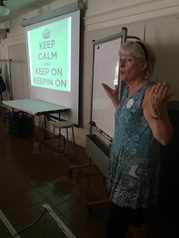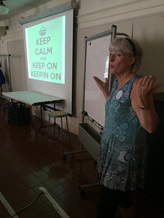
If there is one thing I have learned in this year of teaching kindergarten writers, it is how asynchronous the abilities of 5 year old authors can be. On one hand, children in their first year of formal schooling are brimming with voice and very willing to take risks, leaping off the writing cliff as soon as I say, "Go!" There has not been one day of writing when these students were not one hundred percent "in". They have been like little sponges, soaking up our instruction and putting thoughts and ideas and pictures on paper like nobody's business.
But...they are 5 year olds. And their handwriting and spelling reflect their developmental levels. Don't get me wrong. Many of our kindergartners are using proper capitalization and punctuation, as well as spelling high frequency words correctly in their drafts. But, then there are those that still struggle to form letters correctly. Those that forget to capitalize the first letter of the sentence or add punctuation to the end. Those whose thoughts are still getting a little knotted up on the trip between their brains and their hands.
When is it appropriate to expect student writers to be responsible for editing their work?
As I look over the writers' nonfiction books about rhinos, I wonder what to do about those many pages that need capital letters, periods, spelling corrections, neater handwriting...
Do I instead concentrate on the content objective? After all, these writers have done research using internet websites and books. They have used graphic organizers to keep their notes together. They have written a three page book about their topic. They have illustrated their pages. They have read and reread their books to the teachers and to each other.
And they have worked for about two weeks on these books.
At a higher grade level, I would have considered these first efforts "drafts". And I would have expected students to go back and revise and edit their work for their final copies. But, can I expect a kindergartner to go back in and fix every misspelled word? Erase and rewrite every misshaped letter? Figure out where one sentence ends and the next begins?
Ideally, I think I would move even a little slower with this work the next time I teach it. Perhaps additional modeling of writing the sentences, and maybe providing a bank of words that accompany the topic in general would provide needed support for the less developed writers.
We are going to try this unit again. Next week, in fact. We are going to let the students choose another animal, and we are going to go through the process once more. While I think we may give them more choice in the research and scope of subtopics in the next nonfiction "All-About" book, I will definitely teach more toward how the writers are putting their work on the pages.
But...they are 5 year olds. And their handwriting and spelling reflect their developmental levels. Don't get me wrong. Many of our kindergartners are using proper capitalization and punctuation, as well as spelling high frequency words correctly in their drafts. But, then there are those that still struggle to form letters correctly. Those that forget to capitalize the first letter of the sentence or add punctuation to the end. Those whose thoughts are still getting a little knotted up on the trip between their brains and their hands.
When is it appropriate to expect student writers to be responsible for editing their work?
As I look over the writers' nonfiction books about rhinos, I wonder what to do about those many pages that need capital letters, periods, spelling corrections, neater handwriting...
Do I instead concentrate on the content objective? After all, these writers have done research using internet websites and books. They have used graphic organizers to keep their notes together. They have written a three page book about their topic. They have illustrated their pages. They have read and reread their books to the teachers and to each other.
And they have worked for about two weeks on these books.
At a higher grade level, I would have considered these first efforts "drafts". And I would have expected students to go back and revise and edit their work for their final copies. But, can I expect a kindergartner to go back in and fix every misspelled word? Erase and rewrite every misshaped letter? Figure out where one sentence ends and the next begins?
Ideally, I think I would move even a little slower with this work the next time I teach it. Perhaps additional modeling of writing the sentences, and maybe providing a bank of words that accompany the topic in general would provide needed support for the less developed writers.
We are going to try this unit again. Next week, in fact. We are going to let the students choose another animal, and we are going to go through the process once more. While I think we may give them more choice in the research and scope of subtopics in the next nonfiction "All-About" book, I will definitely teach more toward how the writers are putting their work on the pages.
And, so, if our objective was to do research and learn about a topic, and then write an "All-About" book to teach readers all we know about that topic, I think the kindergartners achieved that objective.
If our objective was to work toward consistent control of capitalization, punctuation, and spelling, I think we still have work to do. And that's okay. As we all know so well, both the composition work and the technical work of writing are built upon layers of learning that are individual to each unique writer. What each writer in our class did learn from this unit was what nonfiction writing can be, how to do research about a topic, some text features that help readers find information in books, and all about the body, food, and habitat of the rhinoceros.
Good stuff!! And next week we will tap again into their enthusiasm and listen for their voices and support them in their usage and mechanics when we start the next "All-About" book. I can hardly wait.
Have a great writing week.
#allkidscanwrite
If our objective was to work toward consistent control of capitalization, punctuation, and spelling, I think we still have work to do. And that's okay. As we all know so well, both the composition work and the technical work of writing are built upon layers of learning that are individual to each unique writer. What each writer in our class did learn from this unit was what nonfiction writing can be, how to do research about a topic, some text features that help readers find information in books, and all about the body, food, and habitat of the rhinoceros.
Good stuff!! And next week we will tap again into their enthusiasm and listen for their voices and support them in their usage and mechanics when we start the next "All-About" book. I can hardly wait.
Have a great writing week.
#allkidscanwrite

 RSS Feed
RSS Feed
